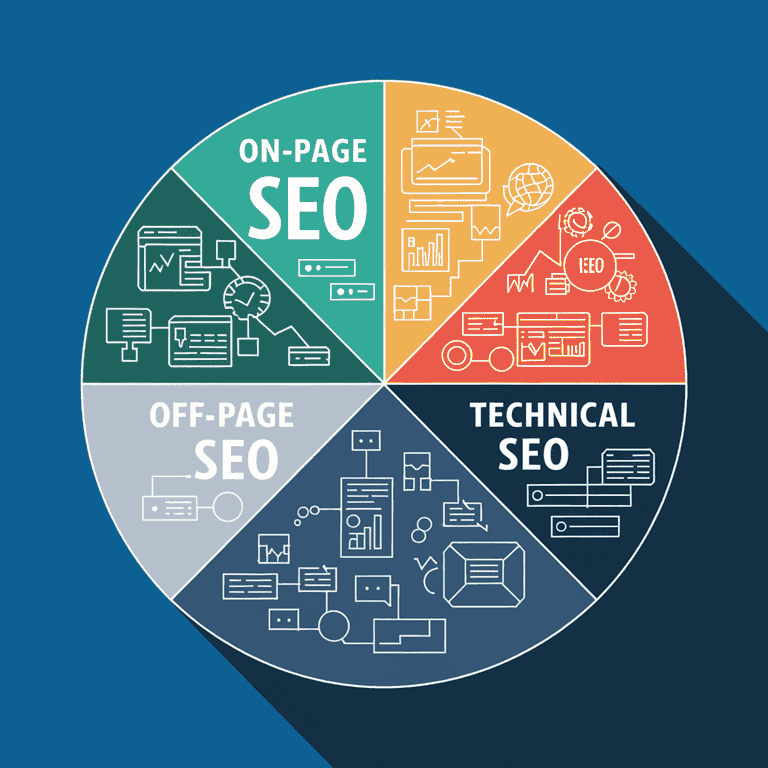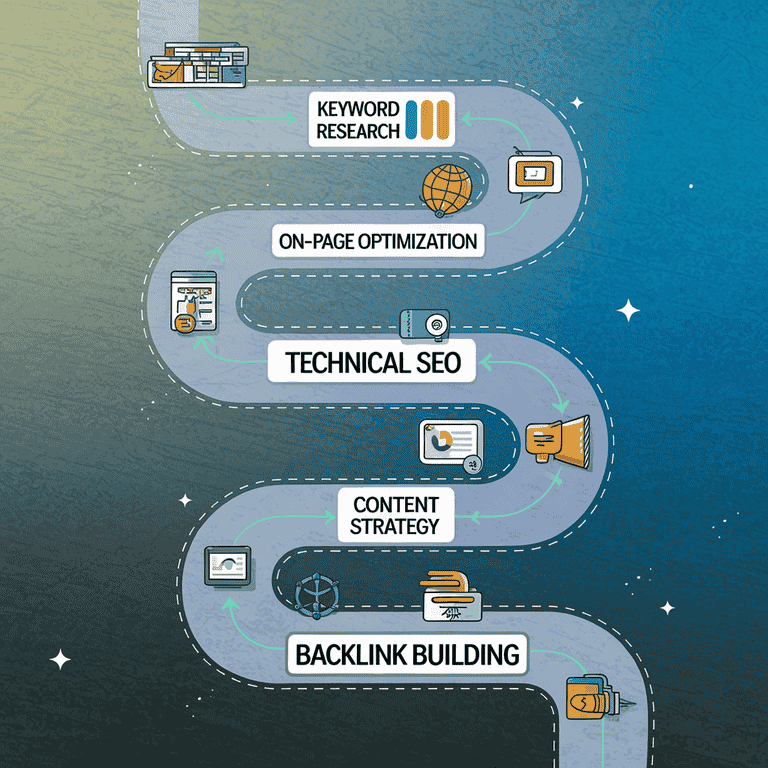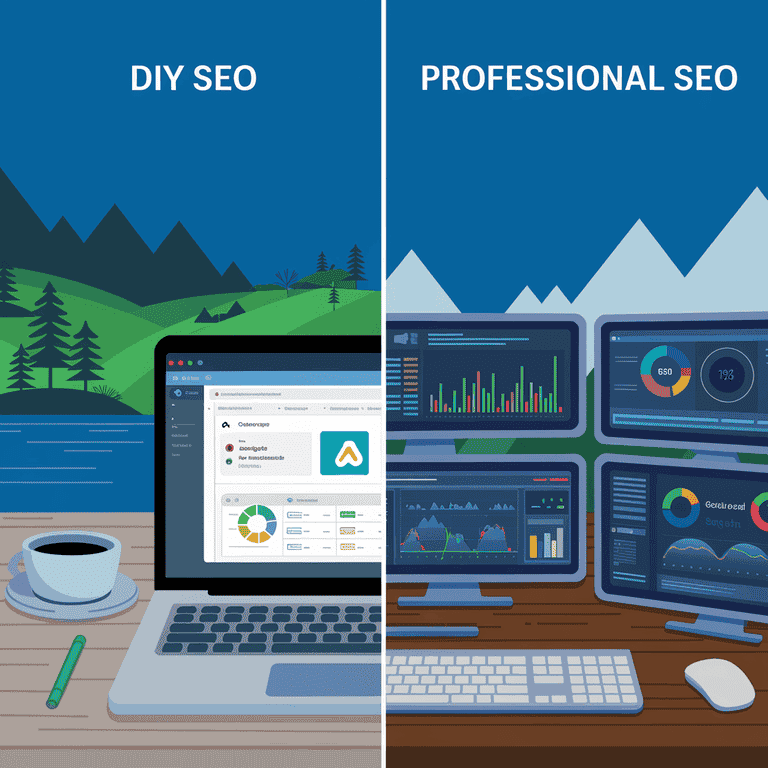If you’re trying to grow your business online, you’ve heard about SEO services. But what exactly are they, and why do they matter? In today’s digital age, being visible online is more than just a bonus—it’s necessary. For businesses of all sizes, SEO services are:
- The backbone of online growth.
- Improving visibility, traffic, and.
- Revenue.
This guide explores the world of SEO services, explaining what they are, why they’re essential, and how they can transform your business. Let’s get started!

What Are SEO Services?
Definition of SEO Services
SEO (Search Engine Optimization) services are various techniques and strategies designed to help websites rank higher in search engine results pages (SERPs). Higher rankings lead to more visibility, which means more clicks, traffic, and conversions.
Core Components of SEO Services
SEO isn’t a one-size-fits-all approach. It comprises several core components, each critical in driving results. Here are the main pillars:
- On-page SEO: Optimizing content and HTML source code to improve relevancy and user experience.
- Off-page SEO: Building external signals through backlinks and brand mentions.
- Technical SEO: Improving the website’s structure and technical foundation for better crawlability and indexing.
- Local SEO: Enhancing visibility for location-based searches to attract customers nearby.
SEO services focus on these components, creating a comprehensive approach to help your site climb the rankings.
Why SEO Services Are Essential for Your Business
Benefits of SEO Services
Investing in SEO services can be a game-changer for your business. Here are some key benefits:
- Increased Organic Traffic and Visibility
- You naturally attract more visitors when your website ranks higher in search results. This is organic traffic—users who find you without paid ads.
- Enhanced User Experience and Website Usability
- Good SEO isn’t just about search engines. It’s also about improving your website’s usability for visitors. This includes fast-loading pages, easy navigation, and mobile-friendly design.
- Higher Conversion Rates and ROI
- SEO targets users actively searching for your products or services, which means these visitors are more likely to convert into paying customers.
Long-Term Impact of SEO
SEO is a long-term investment that builds your brand’s credibility and authority over time. Here’s why:
- Building Brand Credibility and Authority
- When your website consistently ranks high, users trust your brand as an industry leader.
- Establishing a Competitive Edge in Your Industry
- SEO helps you outshine your competitors, especially those who rely solely on paid ads or lack a solid digital presence.

Types of SEO Services Offered by Agencies
On-Page SEO Services
On-page SEO focuses on optimizing elements on your website to make it more relevant and engaging for users and search engines.
Keyword Research and Optimization
- Identifying Relevant Keywords
- An SEO agency researches to find high-value, relevant keywords based on your industry and target audience.
- Optimizing Content for Target Keywords
- These keywords are strategically integrated into your website’s content, headings, and meta tags to boost relevancy.
Content Optimization
- Importance of High-Quality, Relevant Content
- Search engines favor fresh, informative, and engaging content. It’s not just about keywords—it’s about giving your audience what they need.
- Best Practices for Creating SEO-Friendly Content
- Use clear headings, short paragraphs, and bullet points to make content easy to read. Engage the reader with a conversational tone.
Meta Tags and Descriptions
- Writing Effective Title Tags and Meta Descriptions
- Title tags and meta descriptions are your website’s first impression on search engines. They should include target keywords and compelling calls to action.
- Best Practices for H1 and H2 Tags
- Structure your content with clear H1 and H2 tags. This helps users and search engines understand your page’s main topics.
Off-Page SEO Services
Off-page SEO involves building authority and trust through external signals.
Link Building Strategies
- Importance of Building High-Quality Backlinks
- Search engines see backlinks as votes of confidence. The more high-quality backlinks you earn, the higher your site’s authority.
- Strategies for Acquiring Authoritative Links
- These include guest blogging, partnerships with industry leaders, and creating shareable content that attracts natural links.
Social Media Integration
- Leveraging Social Media to Boost Off-Page SEO
- While social media doesn’t directly impact SEO rankings, it does play a crucial role in building brand awareness and driving traffic.
- Importance of Brand Mentions and Social Signals
- Active social media engagement can lead to brand mentions, which search engines consider a sign of credibility.
Technical SEO Services
Website Performance and Speed Optimization
- Tools and Methods for Improving Site Speed
- Fast-loading websites improve user experience and reduce bounce rates. Tools like Google PageSpeed Insights help identify and fix speed issues.
- The Impact of Page Speed on Rankings
- Google considers page speed a ranking factor. A fast site boosts user experience and helps improve your rankings.
Mobile Optimization
- Importance of Mobile-Friendly Design
- With most users browsing on mobile devices, having a responsive design is essential for SEO.
- Best Practices for Responsive Design
- Ensure your site adjusts to different screen sizes and all elements (like buttons and images) are easily clickable on mobile devices.

Local SEO Services
Google Business Profile Optimization
Optimizing your Google Business Profile (formerly known as Google My Business) is essential for businesses that rely on local customers. When people search for services “near me,” your profile is often the first thing they see.
Importance of Accurate Business Listings
Accurate business information is crucial for local SEO. Inconsistencies can confuse search engines and potential customers.
- Name, Address, and Phone Number (NAP) consistency across all online platforms is vital.
- Ensure your business hours are correct, especially during holidays or special occasions.
Tips for Optimizing Your Google Business Profile
- Complete Every Section: Include categories, attributes, and services to improve visibility.
- Use High-Quality Photos: Photos of your products, staff, and location build trust.
- Encourage Customer Reviews: More on this in a minute, but reviews matter—a lot!
Local Citations and Directory Listings
A local citation is any mention of your business’s NAP across the web. These citations often appear in online directories like Yelp, Yellow Pages, or niche-specific directories.
Building and Maintaining Consistent Citations
- Create and Verify Listings on Key Platforms: Start with big players like Yelp, Yellow Pages, and industry-specific sites.
- Maintain Consistency: Make sure your NAP information matches all listings to avoid confusion.
Best Practices for Listing on Local Directories
- Choose reputable directories to list your business. Not all directories are created equal.
- Keep your listings updated and accurate as your business grows or moves locations.
Managing and Responding to Reviews
Positive reviews are like gold in local SEO. They boost your credibility and visibility in local search results. But how you handle negative reviews matters just as much.
Importance of Online Reviews for Local SEO
- Reviews increase trust and play a significant role in local rankings.
- Google and Yelp weigh the number and quality of your reviews in their ranking algorithms.
Strategies for Managing and Encouraging Positive Reviews
- Ask Satisfied Customers: After a significant interaction, kindly request a review.
- Respond to All Reviews: Be polite and professional, even to critical reviews. This shows that you care about customer feedback.
How to Choose the Right SEO Service Provider
Qualities to Look for in an SEO Agency
Choosing the right SEO service provider is a big decision. You need someone who can deliver results and keep you informed every step of the way.
Experience and Proven Results
- Look for agencies that have worked with businesses like yours. Industry-specific experience can be a game-changer.
- Ask for case studies and success stories to see their proven track record.
Transparency and Clear Communication
- A good agency will explain their strategies and keep you updated regularly.
- Avoid agencies that over-promise results or are secretive about their tactics.
Common Red Flags to Avoid
The SEO world is full of promises, and not all are realistic. Here are some red flags to watch for:
- Guaranteed #1 Rankings: No agency can promise this. Search algorithms are complex and ever-changing.
- Black-Hat SEO Tactics: Watch out for unethical practices like keyword stuffing, cloaking, or fake backlinks. They might work short-term but can lead to penalties in the long run.
Questions to Ask Before Hiring
Choosing an SEO provider is like hiring a new team member. You want to find the right fit. Here are a few key questions to ask:
- What is your approach to keyword research and strategy?
- This will tell you if they have a well-thought-out plan.
- Can you provide examples of successful SEO campaigns?
- Look for natural, measurable results in industries like yours.

The Key Elements of a Successful SEO Strategy
Keyword Strategy and Content Planning
Keyword research and content planning are the backbones of any great SEO strategy. They involve knowing what your audience is searching for and creating content that answers their questions.
Importance of Keyword Research in a Successful SEO Strategy
- Use tools like Ahrefs or SEMrush to find relevant, high-value keywords.
- Look for long-tail keywords (phrases with 3+ words) that indicate a user’s intent.
Creating a Content Plan Based on User Intent
- Focus on what your audience wants to know. If you sell hiking gear, create content about local trails or how to choose the right backpack.
- Answer frequently asked questions to capture valuable search traffic.
Technical and On-Page SEO Optimization
Your website’s structure and on-page elements greatly influence how search engines see your site.
Importance of Fixing Technical Issues Like Broken Links and Site Errors
- Broken links and errors can harm your rankings. Regular audits help you stay on top of these issues.
- Fixing these improves user experience and keeps visitors on your site longer.
Critical On-Page SEO Factors for Better Rankings
- Optimize title tags and meta descriptions to include your target keywords.
- Use alt text for all images to help search engines understand them and improve accessibility.
Building Authority and Backlinks
Backlinks are like votes of confidence from other sites. However, not all backlinks are created equal.
Best Practices for Earning High-Quality Backlinks
- Create valuable and shareable content like in-depth guides, infographics, or case studies.
- Reach out to industry influencers or websites for guest blogging opportunities.
Importance of Establishing Industry Authority
- Write expert-level content that answers complex questions in your niche.
- Publish case studies and white papers to demonstrate your knowledge.
Monitoring, Reporting, and Continuous Improvement
SEO isn’t a set-it-and-forget-it strategy. It requires ongoing monitoring and adjustments.
Tools for Tracking SEO Performance
- Use tools like Google Analytics and Google Search Console to track key metrics like traffic, bounce rates, and conversions.
- Monitor your keyword rankings and backlinks with platforms like Ahrefs or SEMrush.
Adapting Strategies Based on Analytical Insights
- Don’t be afraid to pivot if a particular strategy isn’t working. SEO is all about continuous improvement.
The Cost of SEO Services and What to Expect
Average Pricing Models for SEO Services
SEO pricing can vary widely based on the scope, goals, and the provider’s expertise. Understanding the standard pricing models will help you set realistic expectations and budget plans.
Monthly Retainer-Based Services
- How It Works: You pay a monthly fee for ongoing SEO services.
- Why It’s Popular: It provides consistent work on your SEO, allowing for regular updates and strategy adjustments.
- Typical Costs: Monthly retainer fees can range from $500 to $5,000, depending on the provider’s expertise.
Project-Based Pricing
- How It Works: You pay for specific, one-time services like a website audit, keyword research, or an SEO overhaul.
- Why It’s Used: Ideal for businesses needing one-off projects or an SEO jumpstart without ongoing commitments.
- Typical Costs: Project pricing can range from $1,000 to $10,000+, depending on the project’s complexity.
Hourly Pricing
- How It Works: You pay hourly for SEO consulting or services.
- Why It’s Effective: This model works well for smaller tasks or consulting sessions to guide your in-house team.
- Typical Costs: SEO agencies or consultants charge between $100 and $300 per hour.
Factors Affecting the Cost of SEO
SEO isn’t a one-size-fits-all service, and costs can vary based on several key factors:
- Industry Competitiveness
- Competitive industries like legal services, finance, and real estate may require more intensive and ongoing efforts.
- Website Size and Complexity
- Large websites with hundreds of pages or complex structures need more optimization and management than smaller ones.
- Service Scope and Goals
- The broader the scope (e.g., global vs. local SEO), the higher the costs. Setting clear goals helps define the necessary efforts.
ROI Expectations from SEO Services
SEO is an investment, and understanding the return can help you make informed decisions. Here’s what to consider:
- Timeline for SEO Results
- SEO isn’t a quick fix. It usually takes 3 to 6 months to see noticeable improvements in rankings and traffic.
- How to Measure the ROI of an SEO Campaign
- Track key performance indicators (KPIs) like organic traffic growth, conversion rates, and rankings for target keywords. Use tools like Google Analytics to monitor these over time.

DIY vs. Professional SEO Services
When DIY SEO Makes Sense
Some business owners prefer a hands-on approach to their SEO. While DIY SEO can work in certain situations, it’s not for everyone.
Essential SEO Practices for Beginners
- Keyword Research: Use free tools like Google Keyword Planner to find keywords.
- On-Page Optimization: Focus on meta tags, headings, and keyword-rich content.
- Content Creation: Create helpful, engaging, and informative content to attract users.
Free Tools and Resources for DIY SEO
- Google Search Console: Monitor your site’s search performance and identify issues.
- Google Analytics: Track traffic, user behavior, and conversion goals.
- Yoast SEO Plugin: Great for beginners using WordPress to optimize on-page elements.
Benefits of Hiring Professional SEO Services
Hiring a professional can be a game-changer if you’re serious about maximizing your SEO potential.
Access to Expert Knowledge and Experience
- Industry-Specific Expertise: Professionals know what works in different industries and markets.
- Strategic Planning: They can develop long-term strategies aligned with your business goals.
Scalability and Staying Ahead of Algorithm Changes
- Algorithm Updates: SEO experts stay on top of Google’s algorithm changes to keep your site compliant.
- Scalable Strategies: Professionals can scale their efforts as your business grows.
Top SEO Tools Used by Professional Agencies
Keyword Research Tools
Finding the right keywords is fundamental to any SEO strategy. Here are some top tools:
- Ahrefs: Comprehensive tool for keyword research, backlink analysis, and competitive insights.
- SEMrush: Offers keyword research, site audits, and rank tracking in one platform.
- Google Keyword Planner: Free and perfect for getting started with keyword research.
Analytics and Reporting Tools
Tracking and measuring SEO efforts is essential for success. Here’s what the pros use:
- Google Analytics: A must-have for monitoring traffic, user behavior, and conversion rates.
- Google Search Console: Helps monitor site health and track keyword rankings.
- Data Studio: Google’s free reporting tool, ideal for creating custom SEO reports.
On-Page Optimization and Technical SEO Tools
Optimizing content and fixing technical issues is crucial to SEO success. Here are the go-to tools:
- Yoast SEO: A plugin for WordPress that simplifies on-page SEO.
- Screaming Frog: An excellent tool for site audits, identifying broken links, and analyzing technical issues.
- Moz: Offers on-page optimization guidance and site audits to boost SEO performance.

SEO Trends to Watch in the Coming Year
Voice Search and Its Impact on SEO
Voice search is changing the way people find information. Optimizing for voice is crucial for staying ahead.
The Growing Importance of Optimizing for Voice Queries
- Conversational Keywords: Voice searches often ask, “What’s the best restaurant near me?” Use these in your strategy.
- Featured Snippets: Aim for the top spot in Google’s results to increase your chances of being the spoken answer.
Best Practices for Voice Search Optimization
- Focus on Local SEO: Voice searches often include local intent (e.g., “near me” searches).
- Use Structured Data: Adding structured data helps search engines better understand your content.
AI and Machine Learning in SEO
AI and machine learning are rapidly changing the landscape of SEO. It’s essential to stay informed and adapt.
How AI Is Shaping the Future of SEO Strategies
- Content Analysis and Optimization: AI tools can analyze user behavior and suggest improvements for better engagement.
- Predictive Analysis: Machine learning can predict search trends and help you stay ahead.
Practical Uses of AI in Keyword Research and Content Optimization
- AI-Powered Content Creation: Tools like Jasper or Copy.ai can help generate topic ideas and draft engaging content.
- Automated SEO Audits: AI-based tools can quickly run computerized audits to identify technical issues.
The Role of User Experience in SEO
User experience (UX) is becoming a significant factor in how Google ranks websites. You can’t afford to ignore it.
Google’s Core Web Vitals and Their Impact on Rankings
- What Are Core Web Vitals?: Metrics like page loading speed, interactivity, and visual stability.
- Why They Matter: A poor user experience can lead to lower rankings, even if your content is top-notch.
Strategies to Improve User Experience and Engagement
- Mobile Optimization: Ensure your site is responsive and easy to navigate on mobile devices.
- Page Speed: Compress images, use a content delivery network (CDN), and eliminate unnecessary plugins.

Breaking It All Down
By understanding and implementing these strategies, businesses can harness the power of SEO to improve their online visibility and drive growth. Whether you handle SEO independently or hire professionals, staying informed about the latest trends and best practices is critical. Remember, SEO is a long-term investment, but it pays off in more traffic, leads, and conversions when done right.
Frequently Asked Questions
How long does it take to see results from SEO services?
SEO is a long-term strategy, and results typically start to show within 3 to 6 months. However, this depends on factors like your industry’s competitiveness, your website’s current state, and the strategies implemented. Patience is vital, as SEO results compound over time.
Can SEO services guarantee a #1 ranking on Google?
No credible SEO service provider can guarantee a #1 ranking. Search engine algorithms are complex and constantly evolving. While quality SEO can significantly improve your rankings, ensuring a top spot is unrealistic and a red flag to watch out for.
How do I know if an SEO agency is using ethical practices?
Ask potential agencies about their approach to SEO. Look for agencies that prioritize transparency and follow white-hat SEO practices, like creating quality content, building legitimate backlinks, and focusing on user experience. Avoid agencies that use spammy techniques or promise instant results.
What’s the difference between on-page and off-page SEO?
On-page SEO refers to optimization efforts made directly on your website, like content optimization, meta tags, and improving page load speeds. Off-page SEO builds credibility through external factors, like backlinks from reputable sites and social media engagement.
Why is mobile optimization important for SEO?
With most users browsing on mobile devices, having a mobile-friendly website is crucial. Google prioritizes mobile-optimized sites, and poor mobile usability can hurt your rankings. It also enhances the user experience, reducing bounce rates and improving engagement.
How does voice search affect my SEO strategy?
Voice search is becoming increasingly popular, especially for local searches. Optimizing for voice search means focusing on conversational keywords, answering common questions directly in your content, and aiming for featured snippets. This helps your site rank better for spoken queries.
What are Google’s Core Web Vitals, and why do they matter for SEO?
Core Web Vitals are a set of metrics that measure user experience, focusing on page load speed, interactivity, and visual stability. These metrics play a significant role in Google’s ranking algorithm. Improving Core Web Vitals can boost your SEO by enhancing the overall user experience on your site.
How do I track the success of my SEO efforts?
To measure your SEO success, track metrics like organic traffic growth, keyword rankings, conversion rates, and bounce rates. Use tools like Google Analytics and Google Search Console to gain insights and adjust strategies as needed based on performance.
Should I focus more on local SEO or global SEO?
It depends on your business goals and target audience. If you serve a local customer base, prioritize local SEO strategies like optimizing your Google Business Profile and building local citations. A global SEO strategy focused on competitive keywords and content is more suitable if you want to reach a broader audience.
Is DIY SEO enough to rank my website?
DIY SEO can be effective for businesses with smaller budgets or those just starting. However, it requires a significant time commitment and a willingness to learn. As your business grows, professional SEO services can offer expertise and scalability to help you achieve long-term success.
What role do backlinks play in SEO?
Backlinks act as endorsements from other websites. High-quality backlinks from authoritative sites tell search engines that your content is valuable and credible, which can improve your rankings. However, it’s essential to earn backlinks naturally and avoid spammy link-building tactics.
What are structured data and schema markup, and why are they important?
Structured data, or schema markup, is a way to organize and label information on your website. It helps search engines better understand your content and can improve how your pages appear in search results. This is especially helpful for getting rich snippets, which can increase click-through rates.
How often should I update my SEO strategy?
SEO is not a set-it-and-forget-it approach. Continuous performance monitoring, staying informed about algorithm updates, and refining strategies based on what’s working are essential. Quarterly reviews are a good practice, but significant changes should trigger immediate updates.
How do I choose keywords for my SEO strategy?
Choosing the right keywords involves understanding your target audience and what they’re searching for. Use keyword research tools like Ahrefs or Google Keyword Planner to find relevant, high-volume keywords. Focus on a mix of short-tail and long-tail keywords for broader and more specific reach.
What’s the difference between organic and paid search results?
Organic search results are listings that appear naturally based on their relevance to the search query and the site’s SEO efforts. On the other hand, paid search results are advertisements businesses pay to appear at the top of search pages, marked as “Ads” by search engines.
Can social media impact my SEO?
While social media signals don’t directly influence rankings, having an active presence can boost brand awareness, increase traffic to your site, and generate backlinks. Sharing quality content on social media platforms can increase engagement and indirectly support your SEO efforts.
Glossary
Algorithm
A set of rules and calculations used by search engines like Google to determine the relevance and ranking of websites in search results.
Backlinks
Links from one website to another, serving as a signal of credibility and authority. High-quality backlinks from reputable sites improve a website’s SEO ranking.
Black-Hat SEO
Unethical SEO practices aimed at manipulating search engine rankings, such as keyword stuffing, cloaking, or using private link networks. These tactics can result in penalties or bans from search engines.
Bounce Rate
The percentage of visitors who leave a website after viewing only one page. A high bounce rate can indicate poor user experience or irrelevant content.
Conversion Rate
The percentage of visitors who complete a desired action on a website, such as making a purchase, signing up for a newsletter, or filling out a contact form.
Core Web Vitals
A set of metrics used by Google to evaluate user experience, focusing on page load speed, interactivity, and visual stability.
Crawlability
The ability of search engine bots to access and navigate a website’s content for indexing purposes. Good crawlability is essential for effective SEO.
DIY SEO
Search engine optimization efforts carried out by a business owner or individual without the help of an agency or professional. DIY SEO is often done using free or low-cost tools.
Google Business Profile
A free business listing tool provided by Google that allows businesses to manage their online presence, appear in local search results, and engage with customers.
H1 Tag
A specific HTML element used to define the main heading of a webpage. Proper use of H1 tags helps search engines understand the content and structure of a page.
Indexing
The process by which search engines organize and store website content in their database. Indexed content is what appears in search results when users enter a query.
Keyword
A specific word or phrase that users enter into search engines to find information. SEO involves optimizing content around relevant keywords to improve rankings.
Keyword Research
The process of identifying and analyzing popular search terms related to a business or topic. Keyword research helps in creating relevant content that aligns with user searches.
Local Citations
Mentions of a business’s name, address, and phone number (NAP) on other websites, typically in directories like Yelp or Yellow Pages. Consistent local citations improve local SEO.
Meta Description
A short summary of a webpage’s content that appears in search results below the title. Meta descriptions help users understand what a page is about and can impact click-through rates.
Mobile Optimization
Adjusting a website’s design and layout to provide a better experience on mobile devices. Mobile optimization is crucial for SEO, as more users are browsing on smartphones and tablets.
NAP
An acronym for Name, Address, and Phone number. Consistency in NAP information across all online platforms is critical for local SEO success.
Off-Page SEO
Optimization efforts made outside of a website to improve its authority and ranking. Off-page SEO primarily involves building backlinks and managing social media presence.
On-Page SEO
Optimization activities carried out within a website, including keyword placement, content creation, meta tags, and internal linking. On-page SEO helps search engines understand the relevance of a site’s content.
Organic Traffic
Visitors who find a website through unpaid search results. Organic traffic is considered more valuable because it indicates that users are actively searching for related information or products.
Pay-Per-Click (PPC)
A form of online advertising where advertisers pay each time a user clicks on their ad. PPC ads appear above or below organic search results and are labeled as “Ads.”
Rankings
The position of a website in search engine results for specific keywords or queries. Higher rankings generally lead to increased visibility and traffic.
Schema Markup
A form of structured data added to a webpage’s code to help search engines understand its content better. Schema markup can enhance search results with rich snippets, such as reviews or events.
Search Engine Optimization (SEO)
The process of optimizing a website to improve its visibility and ranking in search engine results pages (SERPs). SEO includes various techniques like keyword optimization, content creation, and technical improvements.
Search Engine Results Pages (SERPs)
The pages displayed by search engines in response to a user’s query. SERPs typically include organic results, paid ads, and sometimes rich snippets like featured answers or local listings.
Structured Data
A standardized format for providing information about a webpage and its content. Structured data helps search engines understand and display the content more effectively.
Technical SEO
The process of optimizing a website’s technical elements, such as site speed, mobile-friendliness, and crawlability. Technical SEO ensures that search engines can effectively index and rank a site.
User Experience (UX)
The overall experience a visitor has on a website, including ease of navigation, mobile usability, and page load speed. Good UX is essential for reducing bounce rates and improving rankings.
Voice Search
A type of search where users speak their queries instead of typing them. Voice search is becoming increasingly popular with the rise of smart speakers and virtual assistants, and it requires optimizing content for conversational keywords.
White-Hat SEO
Ethical SEO practices that comply with search engine guidelines, focusing on quality content, natural backlinks, and a positive user experience. White-hat SEO aims for sustainable, long-term results.
Additional Resources for You
Ahrefs – Ahrefs is a popular SEO toolset that provides extensive resources and guides on keyword research, backlink strategies, and competitive analysis.
SEMrush – SEMrush provides an all-in-one marketing toolkit for digital marketers, covering SEO, PPC, and content marketing strategies.
Search Engine Journal – Search Engine Journal is a leading online publication dedicated to the latest news, trends, and expert insights in SEO and digital marketing.
Neil Patel – Neil Patel offers a wealth of SEO tools, guides, and case studies aimed at helping businesses improve their online marketing efforts.
Yoast – Yoast is best known for its SEO plugin for WordPress, but it also provides valuable guides and resources to help users optimize their websites effectively.
Google Search Central – Google Search Central is the official resource from Google with guidelines, best practices, and insights on improving your website’s visibility on Google Search.
Backlinko – Backlinko is an SEO training platform run by Brian Dean, offering in-depth guides, case studies, and practical tips for improving your SEO strategies.

What’s Next?
The SEO tips provided in this guide come directly from our co-founder, Matt LaClear. Since 2009, Matt has successfully managed over 13,277 SEO campaigns for clients, making him a trusted expert. If you’re a qualified and interested small business owner looking to elevate your online presence, don’t miss this opportunity. Request your free custom SEO strategy call today at https://digitalwins.ai/free-custom-seo-strategy-call/ and get tailored insights to help your business grow!

